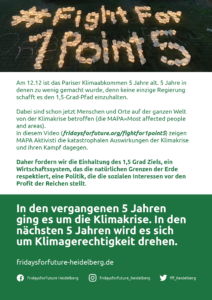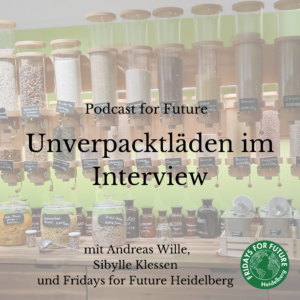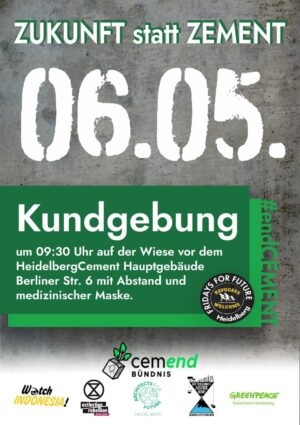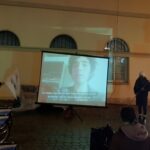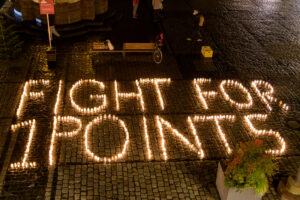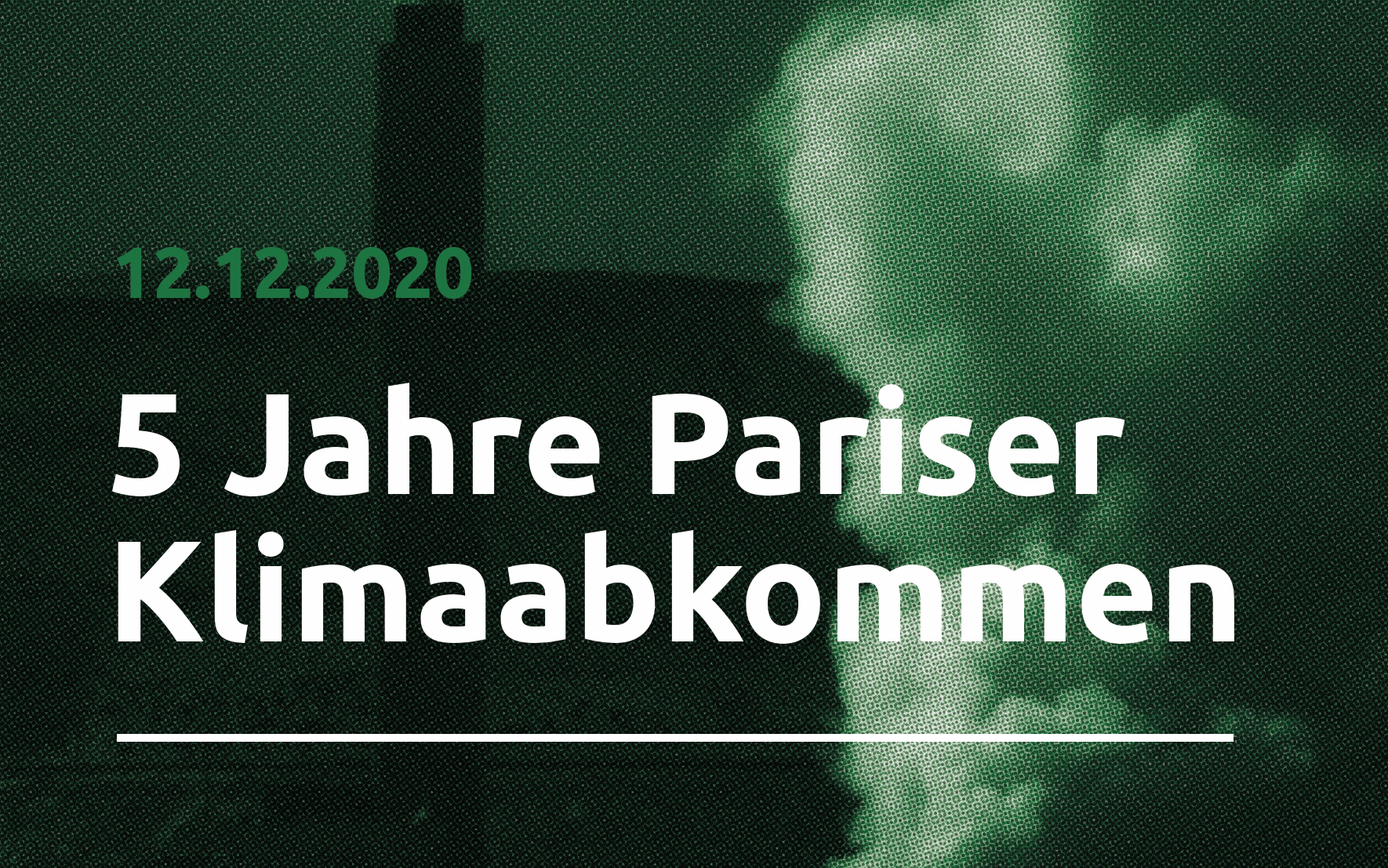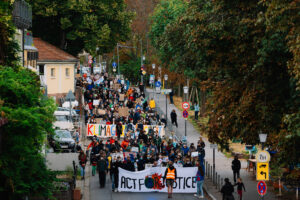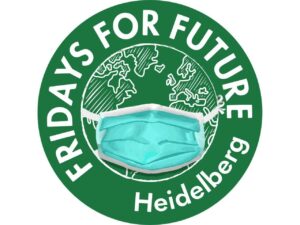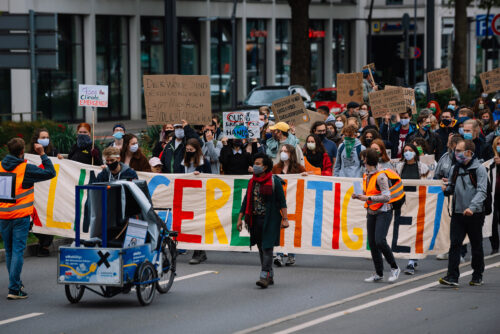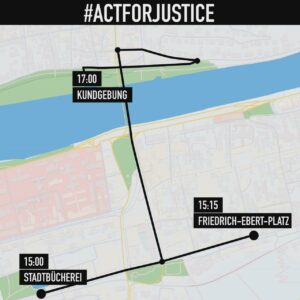Anlässlich des fünf jährigen Bestehens des Pariser Klimaabkommens finden am 11. Dezember weltweit Fridays For Future Proteste statt. Unter dem Motto #FightFor1Point5 organisiert auch Fridays for Future Heidelberg am 11.12.20 mehrere Mahnwachen in verschiedenen Stadtteilen Heidelbergs.
Gemeinsam wollen Aktivist*innen auf der ganzen Welt an diesem Tag sowohl mit unterschiedlichen coronakonformen Aktionen als auch online auf das globale Scheitern der bisherigen Bemühungen die Klimakrise einzudämmen aufmerksam machen.
Sie fordern die Einhaltung des 1,5-Grad-Ziels und eine Klimapolitik, die die bereits heute am stärksten von der Klimakrise betroffenen Regionen und Menschen in den Vordergrund rückt. Der Sonderbericht 2018 des Weltklimarats zeigt den Unterschied zwischen 2 und 1,5-Grad und dabei, dass nur maximal 1,5 Grad Erderwärmung die Lebensgrundlagen von Millionen Menschen sichern kann.
„Meine Heimat, die Phillipinen, wurden von Taifun nach Taifun getroffen. Der Kampf für 1,5 Grad ist existenziell für mein Überleben hier und das so vieler Menschen im globalen Süden. Wir wurden unterdrückt und igoniert, aber wir werden niemals aufgeben. Menschen auf der ganzen Welt geben das Versprechen, weiter für die Einhaltung des 1,5-Grad-Ziels zu kämpfen, denn in den nächsten fünf Jahre muss sich so vieles ändern. Die nächsten fünf Jahre dürfen klimapolitisch nicht so aussehen wie die vergangenen fünf Jahre“, sagt Mitzi Jonelle Tan, Aktivistin von den Phillipinen.
Anlass der Proteste ist das fünfjährige Bestehen des Pariser Klimaabkommen am 12.12.2020. An diesem Tag 2015 unterzeichneten 195 Staaten in Paris das größte bisherige Klimaabkommen. Im Rahmen dessen stellen die Staaten ihre Klimaziele vor, die alle fünf Jahre überprüft werden. Auch 2020 hielten nur wenige Länder ihre selbst festgelegten, oftmals unzureichenden Reduktionsziele ein.
Schon seit der Gründung setzt sich die Fridays for Future Bewegung für Klimagerechtigkeit und für die Einhaltung des 1,5-Grad-Ziels ein. In Deutschland fordert sie u.a. Klimaneutralität bis 2035 sowie einen beschleunigten Ausbau erneuerbarer Energien mit vollständig klimaneutraler Energieversorgung ab 2035.
„Ich habe keine Hoffnungen mehr in unsere Regierungen, deren Ignoranz für die Bedürfnisse der Menschen uns wieder und wieder in Gefahr bringt. Meine einzige Hoffnung liegt bei der Jugend: Wir werden uns zusammenschließen und eine gerechte und lebenswerte Zukunft erkämpfen“, erklärt Disha Ravi aus Indien.
- Am 11.12. werden wir das Video an verschiedenen Standorten in Heidelberg per Beamer auf Leinwänden zeigen📹 Kommt zwischen 17 und 18 Uhr gerne mit Maske und Abstand vorbei😷
Hier könnt ihr das Video am 11.12. von 17 bis 18 Uhr sehen:
- Neuenheim am Marktplatz
- Handschusheim vor der Tiefburg
- Rohrbach Markt
- Boxberg/Emmertsgrund vor dem Seniorenzentrum Boxberg-Emmertsgrund
- Kirchheim, Rathaus
Es wird Licht und Beamer-Installationen geben, die die globalen Kämpfe der Klimagerechtigkeitsbewegung zeigen. Für eine Installation mit Kerzen sammelt die Ortsgruppe aktuell leere Gläser.
